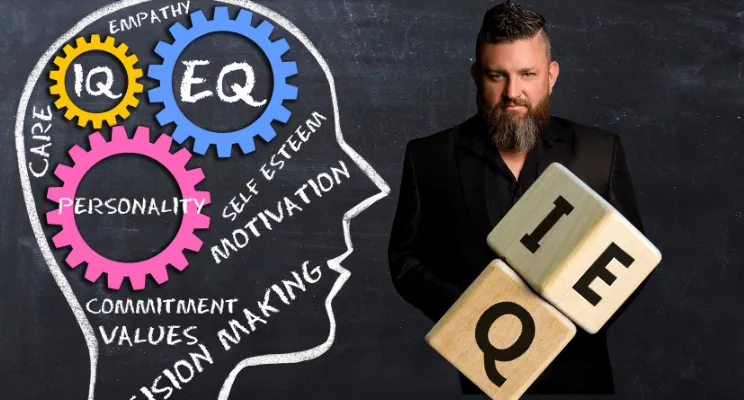
Why Emotionally Intelligent Leaders Make Better Decisions (And How to Become One)
Most leadership mistakes aren’t due to bad strategy. They happen because someone reacted instead of responded. Assumed instead of listened. Controlled instead of coached.
In every high-stakes environment I’ve worked in family businesses, scaling startups, corporate teams there’s one quality that consistently separates strong leaders from forgettable ones. It’s not charisma. It’s not IQ. It’s emotional intelligence (EQ).
When decisions need to be made under pressure, EQ is the skill that helps leaders remain steady, communicate clearly, and choose wisely. And the best part? You don’t need to be a therapist or naturally empathetic to develop it.
You need awareness. You need intention. You need practice.
What Emotionally Intelligent Leaders Actually Do Differently
You’ve heard the catchphrase. You might’ve even listed “strong EQ” on your LinkedIn profile. But let’s get real.
Emotionally intelligent leaders don’t:
Suppress emotions
Avoid hard conversations
Smile and nod to avoid conflict
They do:
Understand the emotion behind a reaction
Manage their state before making a choice
Read the room and adjust without manipulating
According to a 2024 report by The Emotional Intelligence Institute, leaders with high EQ are 38% more effective in team communication, 45% more trusted by peers, and more likely to retain top talent in high-pressure environments.
These aren’t soft outcomes. They’re bottom-line drivers.
Why EQ Changes Your Decision-Making
Most leadership decisions fall apart not because the data was wrong but because the leader’s internal state hijacked the process.
Think about your worst decisions. Were you anxious? Defensive? Rushed? Out of sync with your team?
Now think of your best decisions. Chances are, you felt calm, clear, grounded, and connected to the bigger picture.
That’s what EQ does. It creates the space between impulse and action.
It helps you:
Recognize when ego is driving the decision
Pause before reacting emotionally
Consider how the decision will land emotionally with your team
Course-correct in real time if misalignment shows up
In my coaching work, I’ve seen emotionally intelligent leaders diffuse team breakdowns, win client trust back after conflict, and step out of micromanagement cycles not because of clever strategy, but because they responded with maturity and empathy.
Real-Life Example: When EQ Saved a Team from Implosion
I worked with a second-generation family business where the founder’s son was being groomed to take over operations. He was intelligent, driven, and experienced. But the team couldn’t stand working under him.
Morale was down. People felt invisible. High performers left. Turnover became a pattern.
On paper, everything made sense. But culturally, everything was breaking.
When we unpacked the problem, it wasn’t incompetence. It was emotional blind spots. The son wasn’t managing his tone. He dismissed ideas in meetings. He didn’t understand how his emotional reactivity created fear even when he didn’t mean harm.
Through coaching, we focused on:
Awareness: Tracking emotional triggers
Communication: Slowing down responses, especially under stress
Team engagement: Checking in intentionally before giving directives
The shift didn’t happen overnight, but it happened. Within six months, internal conflict dropped dramatically. The team started speaking up. And execution improved because trust returned.
He didn’t need a new system. He needed a new lens.
How to Build Your Own Emotional Intelligence as a Leader
Let’s get practical. You don’t build EQ by reading about it. You build it by practicing emotional awareness then choosing intentional action.
Start here:
1. Name what you’re feeling before you lead
Before any major conversation or decision, pause and ask:
“What’s the dominant emotion I’m carrying right now?”
If it’s stress, fear, or ego acknowledge it. You can’t lead what you won’t name.
2. Learn the difference between reaction and response
Reaction is fast, emotional, and often defensive.
Response is intentional, grounded, and focused on outcome.
Before replying to tension, pause. Breathe. Ask yourself:
“What would leadership do here not just emotion?”
3. Track emotional patterns in your team
When do people shut down? When do they step up? What language brings clarity? What sparks confusion?
Emotionally intelligent leaders don’t just track metrics. They track moods. That’s where performance lives or dies.
4. Invite feedback on how you make others feel
Leadership is emotional. You’re constantly creating emotional experiences for your team.
Ask your direct reports:
“When I’m leading well, how do I make you feel?”
“When I’m off, what impact does it have on you?”
Then don’t defend. Just listen. That’s EQ in motion.
Leadership in 2025 Requires More Than Strategy
If you want to lead at scale, you can’t rely only on logic.
You need emotional clarity to navigate complexity.
Because your business will keep getting faster. The pressures won’t slow down. And strategy alone won’t help when your team no longer trusts you, feels burnt out, or is disengaged.
What keeps your leadership relevant isn’t how smart you are.
It’s how self-aware, relationally grounded, and emotionally present you are under pressure.
So ask yourself:
Do your reactions build trust or erode it?
Do people feel safer or more anxious after meeting with you?
Are you still leading with presence or just performance?
Emotionally intelligent leaders don’t just lead from the head. They lead from the heart with clarity, boundaries, and emotional control.
It’s not soft. It’s strategic.
And it might be the difference between a team that follows your title and one that follows your vision.
